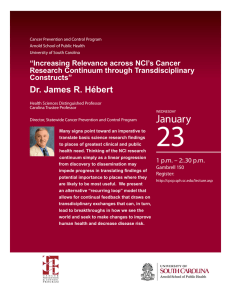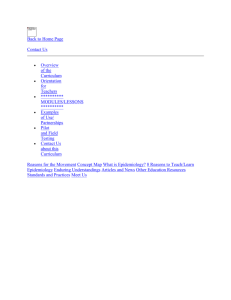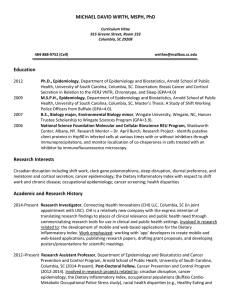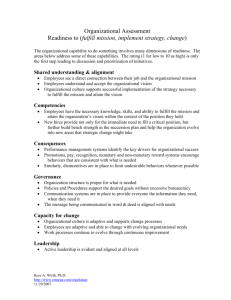MICHAEL DAVID WIRTH, MSPH, PhD Education
advertisement
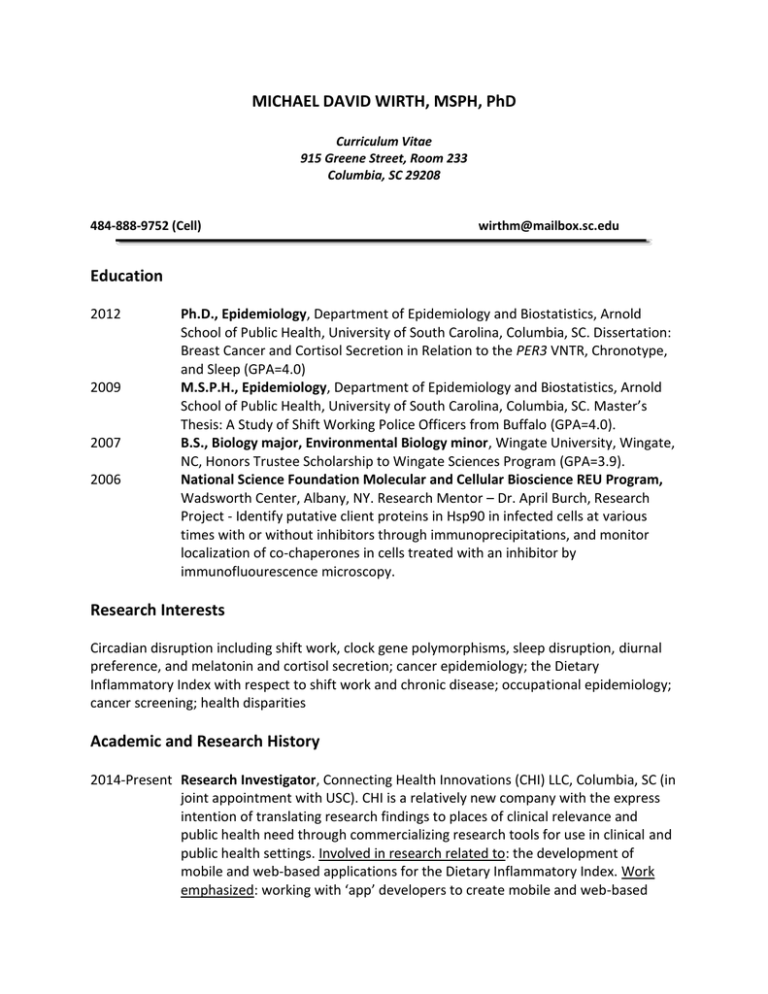
MICHAEL DAVID WIRTH, MSPH, PhD Curriculum Vitae 915 Greene Street, Room 233 Columbia, SC 29208 484-888-9752 (Cell) wirthm@mailbox.sc.edu Education 2012 2009 2007 2006 Ph.D., Epidemiology, Department of Epidemiology and Biostatistics, Arnold School of Public Health, University of South Carolina, Columbia, SC. Dissertation: Breast Cancer and Cortisol Secretion in Relation to the PER3 VNTR, Chronotype, and Sleep (GPA=4.0) M.S.P.H., Epidemiology, Department of Epidemiology and Biostatistics, Arnold School of Public Health, University of South Carolina, Columbia, SC. Master’s Thesis: A Study of Shift Working Police Officers from Buffalo (GPA=4.0). B.S., Biology major, Environmental Biology minor, Wingate University, Wingate, NC, Honors Trustee Scholarship to Wingate Sciences Program (GPA=3.9). National Science Foundation Molecular and Cellular Bioscience REU Program, Wadsworth Center, Albany, NY. Research Mentor – Dr. April Burch, Research Project - Identify putative client proteins in Hsp90 in infected cells at various times with or without inhibitors through immunoprecipitations, and monitor localization of co-chaperones in cells treated with an inhibitor by immunofluourescence microscopy. Research Interests Circadian disruption including shift work, clock gene polymorphisms, sleep disruption, diurnal preference, and melatonin and cortisol secretion; cancer epidemiology; the Dietary Inflammatory Index with respect to shift work and chronic disease; occupational epidemiology; cancer screening; health disparities Academic and Research History 2014-Present Research Investigator, Connecting Health Innovations (CHI) LLC, Columbia, SC (in joint appointment with USC). CHI is a relatively new company with the express intention of translating research findings to places of clinical relevance and public health need through commercializing research tools for use in clinical and public health settings. Involved in research related to: the development of mobile and web-based applications for the Dietary Inflammatory Index. Work emphasized: working with ‘app’ developers to create mobile and web-based applications, publishing research papers, drafting grant proposals, and developing posters/presentations for scientific meetings. 2012–Present Research Assistant Professor, Department of Epidemiology and Biostatistics and Cancer Prevention and Control Program, Arnold School of Public Heath, University of South Carolina, Columbia, SC (2014-Present). Post-Doctoral Fellow, Cancer Prevention and Control Program (2012-2014). Involved in research projects related to: circadian disruption, cancer epidemiology, the Dietary Inflammatory Index, occupational populations (Buffalo Cardio-Metabolic Occupational Police Stress study), racial health disparities (e.g., Healthy Eating and Activity Living in the Spirit intervention trial), colorectal cancer screening, and weight dissatisfaction. Work emphasized: publishing research papers, drafting grant proposals, developing posters/presentations for scientific meetings, guest lecturing, mentoring graduate students, and teaching courses. 2007 – 2012 Graduate Research Assistant under Dr. James Burch, Dr. Robin Puett, Dr. James Hébert and Tom Hurley, Cancer Prevention and Control Program, Department of Epidemiology and Biostatistics, Arnold School of Public Health, University of South Carolina, Columbia, SC. Involved in research projects related to: circadian disruption, racial disparities, cancer, and environmental and occupational health. Work emphasized: assisting with data collection, statistical analyses, and development of manuscripts and posters for presentation in addition to my masters and dissertation work. 2003 – 2007 Laboratory Assistant/Organic Chemistry Tutor/Student Center Supervisor, Wingate University, Wingate, NC. Peer-Reviewed Publications 1. Modayil MV, Wirth MD, Murphy EA, Hurley TG, Hébert JR. Effect of Cruciferous Vegetable Intake on Oxidative Stress Biomakers: Differences by Breast Cancer Status. Nutrition and Cancer (submitted). 2. Robb SW, Haslam A, Wirth MD, Gay JL, Middleton L, Healy M, Hébert JR. Relationship between Meditation and Waking Salivary Cortisol Secretion among Long-term MBSR Meditators. Health Psychology (submitted). 3. Wirth MD, Shivappa N, Hurley TG, Hébert JR. Association between Previously Diagnosed Circulatory Conditions and a Dietary Inflammatory Index. Nutrition, Metabolism & Cardiovascular Diseases (submitted). 4. Panagos PG, Vishwanathan R, Penifield-Cyr A, Matthan NR, Shivappa N, Wirth MD, Hébert JR, Sen S. Breastmilk from Obese Mothers Has Pro-inflammatory Properties and Decreased Neuroprotective Factors. Journal of Nutrition (submitted). 5. Wirth MD, Hébert JR, Hand GA, Youngstedt SD, Hurley TG, Shook RP, Paluch AE, James SL, Blair SN. Association between Actigraphic Sleep Metrics and Body Composition. Annals of Epidemiology (resubmitted). 6. Montresor-López JA, Yanosky JD, Mittleman M, Sapkota A, He X, Hibbert J, Wirth MD, Puett RC. Short-term Exposure to Ambient Ozone and Acute Stroke Risk: a Case-Crossover Analysis. Journal of Exposure Science and Environmental Epidemiology (resubmitted). 7. Adams SA, Wirth MD, Khan S, Murphy EA, Heiney SP, Davis L, Davis B, Drayton R, Hurley TG, Blair SN, Hébert JR. The Association of C-Reactive Protein and Physical Activity Among African Americans. American Journal of Preventive Medicine (resubmitted). 8. Harmon BE, Chock M, Brantley E, Wirth MD, Hébert JR. Disease Messaging in Churches: Implications for Health Communication in African-American Communities. Journal of Religion and Health (revise and resubmit requested). 9. Burch JB, Everson TM, Seth RK, Wirth MD, Chatterjee S. Trihalomethane exposure and biomonitoring for the liver injury indicator, alanine aminotransferase, in the United States population (NHANES 1999-2006). Science of the Total Environment 2015:(EPUB ahead of print). 10. Wirth MD, Shivappa N, Steck SE, Hurley TG, Hébert JR. The dietary inflammatory index is associated with colorectal cancer in the National Institutes of Health–American Association of Retired Persons Diet and Health Study. British Journal of Nutrition 2015:(EPUB ahead of print). 11. Turner-McGrievy GM, Wirth MD, Shivappa N, Wingard EE, Fayad R, Wilcox S, Frongillo EA Hébert JR. Randomization to plant-based dietary approaches leads to larger short-term improvements in Dietary Inflammatory Index scores and macronutrient intake compared to diets that contain meat. Nutrition Research 2015; 35(2): 97-106 (PMID: 25532675). 12. Adams SA, Heiney SP, Brandt HM, Wirth MD, Khan S, Johnson H, Davis L, Wineglass C, Warren-Jones TY, Felder T, Drayton R, Davis B, Farr DE, Hébert JR. A Comparison of a Centralized Versus De-Centralized Recruitment Schema in Two Community-Based Participatory Research Studies for Cancer Prevention. Journal of Community Health 2015; 40(2):251-259 (PMCID: PMC4315761). 13. Wirth MD, Blake CE, Hébert JR, Sui X, Blair SN. Metabolic Syndrome and Discrepancy between Actual and Self-Identified Good Weight: Aerobics Center Longitudinal Study. Body Image 2015; 13: 28-32 (PMCID: PMC4369422). 14. Wirth MD, Jaggers J, Blair SN, Hébert JR, Youngstedt SD, Dudgeon W, Hand GA. Association of Markers of Inflammation with Sleep and Physical Activity among People Living with HIV or AIDS. AIDS and Behavior 2014 (EPUB ahead of print; PMID: 25399034). 15. Wirth MD, Burch J, Shivappa N, Violanti J, Burchfiel C, Fekedulegn D, Andrew M, Hartley T, Miller DB, Mnatsakanova A, Charles L, Vena JE, Hébert JR. Association of a Dietary Inflammatory Index with Inflammatory Indices and the Metabolic Syndrome among Police Officers. Journal of Occupational and Environmental Medicine 2014; 56(9): 986-989 (PMCID: PMC4156884). 16. Wirth MD, Brandt HM, Dolinger HD, Hardin JW, Sharpe PA, Eberth JM. Examining Connections between Screening for Breast, Cervical, or Prostate Cancer and Colorectal Cancer Screening. Colorectal Cancer 2014; 3(3): 253-263 (PMCID: PMC4134878). 17. Wirth MD, Burch JB, Hebert JR, Kowtal P, Kapoor A, Steck SE, Hurley TG, Gupta PC, Pednekar MS, Youngstedt SD, Zhang H, Sarin R. Case-Control Study of Breast Cancer in India: Role of PERIOD3 Clock Gene Length Polymorphism and Chronotype. Cancer Investigation 2014; 32(7): 321-329 (PMCID: PMC4100474). 18. Wirth MD, Blake CE, Hébert JR, Sui X, Blair SN. Chronic Weight Dissatisfaction Predicts Type 2 Diabetes Risk: Aerobic Centers Longitudinal Study. Health Psychology 2014; 33(8): 912919 (PMCID: PMC4115022). 19. Wirth MD, Burch J, Shivappa N, Steck SE, Hurley TG, Vena JE, Hébert JR. Dietary Inflammatory Index Scores Differ by Shift Work Status: NHANES 2005-2010. Journal of Occupational and Environmental Medicine 2014; 56(2): 145-148 (PMCID: PMC3922825). 20. Hébert JR, Wirth MD, Harmon BE, Davis L, Hurley TG, Davis B, Murphy EA, Shivappa N, Wilcox S, Adams SA, Brandt HM, Blake CE, Steck SE, Blair SN. C-Reactive Protein in African Americans: A Diet and Lifestyle Randomized Community Trial. American Journal of Preventive Medicine 2013; 45(4):430-440 (PMCID: PMC3779347). 21. Wirth MD, Burch J, Violanti J, Burchfiel C, Fekedulegn D, Andrew M, Zhang H, Miller DB, Youngstedt SD, Hébert JR, Vena JE. Association of the Period 3 Clock Gene Length Polymorphism with Salivary Cortisol Secretion among Shift-Working Police Officers. Neuroendocrinology Letters 2013; 34(4):27-37 (PMCID: PMC3655703). 22. Wirth MD, Vena, JE, Smith EK, Bauer SE, Violanti J, Burch JB. The Epidemiology of Cancer among Police Officers. American Journal of Industrial Medicine 2013; 56(4): 439-453 (PMCID: 3655699). 23. Wirth MD, Burch J, Violanti J, Burchfiel C, Fekedulegn D, Andrew M, Zhang H, Miller DB, Hébert JR, Vena JE. Shiftwork duration and the awakening cortisol response among police officers. Chronobiology International 2011; 28:446-457 (PMCID: PMC3655701). Non-Refereed Publications/Letters to the Editor 1. Steck SE, Shivappa N, Tabung FK, Harmon BE, Wirth MD, Hurley TG, Hébert JR. The Dietary Inflammatory Index: A New Tool for Assessing Diet Quality Based on Inflammatory Potential. The Digest: The Research Dietetic Practice Group of the Academy of Nutrition and Dietetics 2014; 49:1-9 (non-Refereed publication). 2. Hébert JR, Shivappa N, Tabung F, Steck SE, Wirth MD, Hurley TG. On the use of the dietary inflammatory index in relation to low-grade inflammation and markers of glucose metabolism in the Cohort study on Diabetes and Atherosclerosis Maastricht (CODAM) and the Hoorn study. American Journal of Clinical Nutrition 2014; 99:1520-1520 (PMID: 24847105, letter to the editor). Invited Book Chapters 1. Wirth MD, Burch JB, Vena JE. Cancer incidence among police officers. 2014. In: Dying for the Job: Police Work Exposure and Health. Charles C Thomas, Springfield, Illinois, USA. 2. Baughman P, Fekedulegn D, Charles LE, Gu JK, Ma C, Violanti JM, Wirth MD, Mnatsakanova A, Hartley TA, Andrew ME, Burchfiel CM. Health Hazards of Shift Work. 2014. In: Dying for the Job: Police Work Exposure and Health. Charles C Thomas, Springfield, Illinois, USA. 3. Burch JB, Wirth MD, Yang X. Disruption of circadian rhythms and sleep: role in carcinogenesis. 2013. In: Kushida CA (Ed), Encyclopedia of Sleep. Elsevier, Oxford, UK. Conference Oral Presentations or First Author Posters 1. Wirth MD, Hébert JR, Brandt HM, David L, David B, Harmon BE, Hurley TG, Drayton R, Adams SA, Blair SN. Effects of the Healthy Eating and Active Living in the Spirit (HEALS) Educational and Behavioral Intervention on Inflammation among an African-American Faith Community. American Association for Cancer Research: The Science of Cancer Health Disparities in Racial/Ethnic Minorities and the Medically Underserved, November 2014, San Antonio, Texas (Poster). 2. Wirth MD, Brandt HM, Dolinger HD, Hardin JW, Sharpe PA, Eberth JM. Associations between previous breast, cervical, or prostate cancer screenings and colorectal cancer screening adherence. Center for Colon Cancer Research at the University of South Carolina, January 2014, Columbia, South Carolina (Poster). 3. Wirth MD, Blake CE, Hébert JR, Sui X, Blair SN. Chronic Weight Dissatisfaction Predicts Type 2 Diabetes Risk: The Aerobic Center Longitudinal Study. 19th Annual Diabetes Fall Symposium at the Medical University of South Carolina, September 2013, North Charleston, South Carolina (Poster). 4. Wirth MD, Adams SA, Davis L, Hurley TG, Davis B, Murphy EA, Shivappa N, Heiney SP, Blair SN, Hebert JR. The Effect of Physical Activity of Inflammation among a Church-Based Population of African Americans. James E. Clyburn Health Disparities Lecture at the University of South Carolina, April 2013, Columbia, South Carolina (Poster). 5. Wirth MD, Burch JB, Steck SE, Hurley TG, Sarin R, Gupta PC, Hebert JR. Circadian Disruption Indicators and Breast Cancer Risk among Women in India. International Society for Environmental Epidemiology, August 2012, Columbia, South Carolina (Oral Presentation). 6. Wirth MD, Burch JB, Violanti J, Burchfiel C, Fekedulegn D, Andrew M, Zhang H, Miller DB, Vena J. Shift Work Duration and Patterns of Salivary Cortisol among Police Officers. South Carolina Public Health Association, May 2010, Myrtle Beach, South Carolina (Oral Presentation). 7. Wirth MD, Burch A. The Effects of Hsp90 Inhibitors on HSV-I Early Infection. Alpha Chi National Convention, March 2007, San Antonio, Texas (Oral Presentation). Invited Presentations Mar, 2015 Feb, 2015 Nov, 2014 On behalf of Connecting Health Innovations, LLC for Blue Cross Blue Shields Group Leader (Customer) Workshops, “The Dietary Inflammatory Index (DII), a Breakthrough Collaboration”, Charleston, SC. Colloquium Series at the Cancer Prevention and Control Program, University of South Carolina, “The Creation and Evolution of The Dietary Inflammatory Index”, Columbia, SC Colloquium Series at the Cancer Prevention and Control Program, University of South Carolina, “Health Impacts of Circadian Disruption with Modification by Lifestyle Factors”, Columbia, SC. April, 2014 Jan, 2013 Colloquium Series at the Cancer Prevention and Control Program, University of South Carolina, “Sleep Disruption, Physical Activity, and Inflammation among People Living with HIV/AIDS”, Columbia, SC. Brownbag Seminar Series for the Department of Epidemiology and Biostatistics, University of South Carolina, “Circadian Disruption Indicators and Health Impacts from the BCOPS and BRCA GEL Studies”, Columbia, SC. Teaching History Spring, 2015 Principals of Epidemiology, EPID 410 (role: instructor), University of South Carolina (3 credit hours) Fall, 2010 Principals of Epidemiology, EPID 410 (role: teaching assistant), University of South Carolina (3 credit hours) Invited Class Lectures Spring, 2015 Cancer Epidemiology (EPID 746, University of South Carolina), ‘Evaluating Cause: Chronobiology and Circadian Disruption’ Spring, 2015 Seminar in Epidemiology (EPID 7100, University of Georgia), ‘Shift Work and Other Circadian Disrupters’ Fall, 2014 Seminar in Epidemiology (EPID745, University of South Carolina), ‘Thesis Process Tips from Beginning to End’ Spring, 2014 Cancer Biology (BIOL A540, University of South Carolina-Aiken), ‘Circadian Disruption and Cancer’ Spring, 2014 Seminar in Epidemiology (EPID 845, University of South Carolina), ‘Discussion Panel: Time Management’ Spring, 2014 Cancer Epidemiology (EPID 8410, University of Georgia), ‘Chronobiology and Cancer’ Fall, 2013 Discussion Panel (The Cancer Prevention and Control Program), ‘Career Development Workshop’ Fall, 2013 Seminar in Epidemiology (EPID745, University of South Carolina), ‘Thesis Process Tips from Beginning to End: Extension to Dissertation Work’ Spring, 2013 Cancer Epidemiology (EPID 746, University of South Carolina), ‘Evaluating “Cause” – Chronobiology and Circadian Disruption’ Spring, 2013 Biological Basis of Public Health (EPID 725, University of South Carolina), ‘Introduction to Cancer Biology’ Honors and Awards 2012 2010 Awarded 2012 Alice Hamilton Award Honorable Mention from NIOSH, Epidemiology and Surveillance Category for manuscript entitled ‘Shiftwork duration and the awakening cortisol response among police officers’. Inducted into Delta Omega Honorary Society, Mu Chapter 2010 Inducted into Golden Key International Honor Society 2003 – 2007 Selected to Dean’s and President’s List every semester at Wingate University 2006 Inducted into Alpha Chi Undergraduate Honor Society Professional Service and Memberships Scientific Conference Services Aug, 2014 Panelist for session titled ‘Innovation and Enterpreneurialism: The Dietary Inflammatory Index’, SC Regional Cancer Health Disparities Program (GMaP) Conference, Columbia, SC. Aug, 2012 Chair for session titled ‘Occupation and Cancer’, International Society for Environmental Epidemiology 24th Annual Conference, Columbia, SC. Peer-Review Services 2015 2014 2014 2012 Peer Reviewer for Journal of Academy of Nutrition and Dietetics (1 manuscript); Industrial Health (1 manuscript); AIDS and Behavior (2 manuscripts); and PLOS ONE (1 manuscript). External Peer Reviewer for a National Institute of Occupational Safety and Health (NIOSH) intramural grant. Peer Reviewer for Mayo Clinic Proceedings (1 manuscript); Cancer Medicine (1 manuscript); Archives of Environmental and Occupational Health (1 manuscript); Psychoneuroendocrinology (2 manuscripts); Biomedical and Environmental Sciences (1 manuscript); and Physiology and Behavior (1 manuscript). Peer Reviewer for Psychoneuroendocrinology (1 manuscript). Organizational Memberships 2014-Present Member of the Society for Research on Biological Rhythms (SRBR). 2013-Present Member of the American Public Health Association (APHA). 2013-2014 Member of the International Society for Environmental Epidemiology (ISEE). 2010-2011 Member (student) of the South Carolina Public Health Association (SCPHA). Media Coverage Oct, 2014 Interviewed by Sarah Trotto, National Safety Council’s Safety + Health, “Exploring shift worker health”. Academic Service Departmental Committees 2014-Present Co-Chair for the Fun & Frolic Committee for the Department of Epidemiology and Biostatistics, University of South Carolina. Thesis/Dissertation Committee and Advisees 2015-Present Doctoral dissertation committee member for William Lindbald, Department of Epidemiology and Biostatistics, University of Georgia (in progress). 2014-Present Doctoral dissertation committee member for Daria McMahon, Department of Epidemiology and Biostatistics, University of South Carolina, “Effects of chronotype on behavioral outcomes from the Energy Balance study” (in progress). 2014 Academic advisor to one Master’s student. Previous Support 2009 – 2011 Behavioral-Biomedical Interface Program (BBIP) – NIH/NIGMS T32 pre-doctoral research. This interface program aims to prepare behavioral scientists in training to biomedical/biological content and methods so that they will function effectively as members of interdisciplinary research teams. Active Grant Funding Project Title: Developing the Dietary Inflammatory Index for Clinical Application. Co-Principal Investigators: Nitin Shivappa, PhD (c) and Michael Wirth, MSPH, PhD. Agency: National Institutes of Health. Type: SBIR. Period: 2014-2016. Project Costs: $1,811,151 Direct, $1,738,000 Total. Objectives: The Dietary Inflammatory Index (DII) is a tool that will form the basis of counseling/instructional systems aimed at helping patients and their providers to control chronic, systemic inflammation by improving diet. Phase I will focus on developing the reporting systems (i.e., mobile/web applications) used by the patient. Phase II will build upon Phase I which includes an intervention trial based on DII response-associated recommendations aimed at reducing chronic inflammation. Role: Co-PI (75% year 1, 100% year 2, 50% year 3). Submitted Grants/Funding Project Title: Mindfulness intervention to improve symptomology among cancer survivors; focus on sleep and stress improvement. Principal Investigator: Drs. Michael Wirth, Sara Wagner Robb, and Mark O’Rourke. Agency: Greenville Health System: Transformative Research See Grant. Period: 2015-2016. Project Costs: $19,891. Objectives: This study will provide preliminary data examining the relationship between mindfulness-based stress reduction and improvement in sleep and stress among cancer patients. This data will better inform the development of a larger grant proposal. Role: Co-PI (0%, in kind). Pending. Project Title: Combined Effects of Sleep, Diet, and Physical Activity on Markers of Inflammation. Co-Principal Investigators: Xuemei Sui, MD, MPH, PhD and Michael Wirth, MSPH, PhD. Agency: National Institutes of Health. Type: R21 Period: 2015-2016. Project Costs: $274,976 Direct, $395,870 Total. Objectives: Chronic inflammation is a risk factor for numerous chronic disorders, including cancer. This is the first study to address which lifestyle factor (i.e., sleep, dietary-related measures, physical activity) or combination of factors most contributes to inflammation. Role: Co-PI (20% year 1, 20% year 2). Pending. Project Title: HRV Biofeedback in Cancer Patients: Pilot Intervention. Co-Principal Investigators: James Burch, MS, PhD and J.P. Ginsberg, MA, PhD. Agency: National Institutes of Health. Type: R21 Period: 2015-2016. Project Costs: $275,000 Direct, $394,366 Total. Objectives: This randomized, controlled biobehavioral pilot intervention will examine whether heart rate variability biofeedback (HRV-B) reduces pain, stress, fatigue, insomnia, and depression among head and neck cancer patients. Role: co-investigator (20% year 1, 20% year 2). Pending. Project Title: Changes in cardiorespiratory fitness and waist circumference across age groups and birth cohorts for individuals with type 2 diabetes; a comprehensive analysis using quantile regression. Principal Investigator: Drs. Andrew Ortaglia and Matteo Bottai. Agency: NIDDK. Period: 2015-2016. Project Costs: $275,000, $402,511 Total. Objectives: This study will comprehensively assess changes in CRF and waist circumference as study participants’ age while making comparisons between those with and without type 2 diabetes across birth cohorts. Role: Co-investigator (10% Year 1, 10% Year 2). Pending. Project Title: Meditation’s effect on cortisol: potential modification by a PERIOD 3 clock gene polymorphism. Co-Principal Investigators: Sara Wagner-Robb, MSPH, PhD and Michael Wirth, MSPH, PhD. Agency: National Institutes of Health; National Center for Complementary and Alternative Medicine. Type: R21 Period: 2015-2016. Project Costs: $275,000 Direct, $421,916 Total. Objectives: This is the first study to address whether a Mindfulness-Based Stress Reduction (MBSR) program in conjunction with a clock gene polymorphism influences cortisol secretion. Role: Co-PI (20% year 1, 20% year 2). Revising. Project Title: Sleep Disorder Diagnoses and Mortality among Cancer Patients. Co-Principal Investigators: Jim Burch, MS, PhD and Michael Wirth, MSPH, PhD. Agency: National Instiitutes of Health; National Cancer Institute. Type: R03. Period: 2015-2016. Project Costs: $100,000 Direct, $146,500 total. Objectives: This retrospective cohort study will combine cancer registry and medical claims data to test the hypothesis that diagnosed sleep disorders are associated with increased mortality in a large population-based sample of cancer patients. Role: Co-PI (10% year 1, 15% year 2). Revising.
